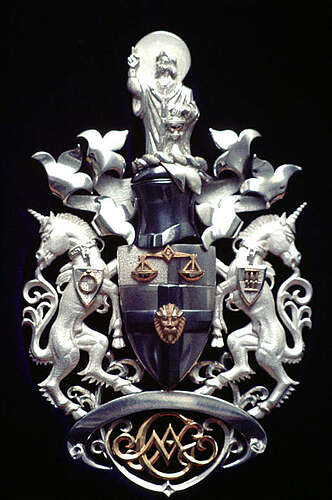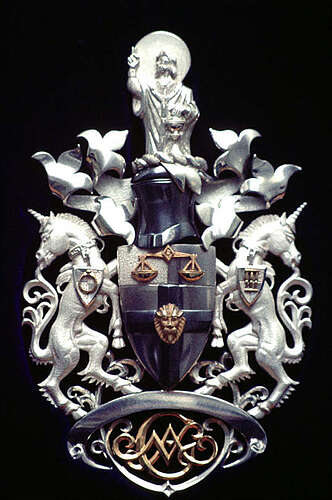Hi all, this is James Miller.
I have had a number of emails asking for details on how I made my
masterpiece as shown here:
Many of the enquiries assume that I made the figures in wax and then
cast them. This is not true, each figure on the crest was fabricated
from silver sheet and hand carved to shape before textures were
added by chasing methods, NONE of this badge is the product of any
casting methods. As this was my end of apprenticeship masterpiece it
had to show all of the techniques of manufacture that I had learned.
These techniques were as follows. Following a design and deciding how
to manufacture the badge, each section was made seperately and the
whole piece was assembled when finished using small hand made screws
and threads. First was the drawing of the design sections onto sheet
before outlining the drawings by hand engraving them, then hand
piercing ( my speciality ), followed by hammering the sections into
shape where needed then chasing and texturing the shapes, and finally
polishing, colouring and gilding. To cap it all I made the interior
fittings to the presentation case as well. When finished the badge
weighed three ounces. If anyone is interested take a look at page 14
on the Ganoksin “Bench Exchange” section and there you will find a
photo of me, as an apprentice actually making the masterpiece
badge/crest. The badge design was a design drawn up for a badge of
office for the National Association of Goldsmiths, this design was
not accepted so it was given to me as my masterpiec project. The
designer was Mr. Theodore Wise, who was a Master hand engraver, who’s
workshop was one floor above our workshop, as an apprentice I used to
visit his workshop every day, because I used to do Hand saw piercing
for him as a sideline.
Peace and good health to all
James Miller, and if anyone is interested here are my official titles,
Freeman of the Worshipful Company of Goldsmiths
Freeman of the City of London
Fellow of the Institute of Professional Goldsmiths

